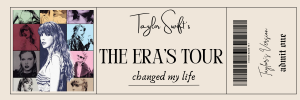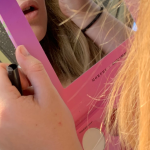By Lucy Czerwinski
In 1985, the lyrics of ‘Man Overboard’ captured the attention of an unexpecting mainstream audience. Whilst lyrics about penis envy and pubic hair barely make a splash in pop in 2019, you must understand Australia was a very different place in the 80s. Deborah Conway’s broad vocals gave a rarely explored female perspective of heterosexual relationships. The romanticism of male-female domestic partnerships was split apart to reveal complex sordidness and vitriol. And in January I saw them in an all-female lineup, over 30 years since their formation.
Do Re Mi had a jangly, funky, often perplexingly inorganic sound which I didn’t expect to be replicated when I saw them in January. The rich instrumentation, so true to the original recordings can be attributed to Julia Day playing eclectic percussion and Conway’s daughter, Clio Rener, on keys. Helen Carter on bass was an absolute force in black and pink, everything from her nails, to her guitar, to her hair in coloured cohesion. Her elaborate, counter-melodic basslines set Do Re Mi apart in a sea of alternative bands, sheltering from the yuppy-ism of the 80s. She was hilariously self-deprecating and witty, chiming in at just the right time to compliment Conway’s tales. There was no way to interpret that Carter was not having a ball; so starkly opposed to her pouty alter ego exuding attitude, box-stepping in sync with Conway on Countdown.
Do Re Mi only released two LPs before Conway “sold out” as Conway so satisfyingly put it. Of course, she did. Fans knew it. But it was far nicer to hear her say it. Conway had an extremely successful solo career with seminal albums like Bitch Epic and String of Pearls which feature radio hits like It’s Only The Beginning and Alive and Brilliant.
Do Re Mi’s second album is so dramatically different than the first, joined only by Conway’s rich, soaring vocals and clever and cutting lyrics, cynical of the mundanity of existence. I’m not inclined to say The Happiest Place In Town was more radio friendly, but definitely cleaner, less erratically rhythmic and with far less funk influence.
Do Re Mi’s lead singer has always had a reputation of being somewhat difficult to work with. This probably means she had the audacity to have an opinion. She’s released a stomach-turning number of albums and her project Broad has shone the spotlight on so many female artists. Conway has always been my angry big sister. Someone with the guts to shout at men on buses who won’t shuffle into a single chair. Haunt You flooded my body with adrenaline and cathartic rage.
Very early on in the setlist they played Man Overboard, the alternate version from an early EP called The Waiting Room. At the time I thought this was the band’s way of giving an aging audience what they wanted; their big hit but smack on a punk time signature to make it palatable to play ad nauseum. But despite my initial disappointment, the album version of Man Overboard had been cruelly saved for dessert. We just had to eat our vegetables first; dazzlingly powerful album tracks.
The night finished with The Happiest Place In Town, the title track from the band’s second album. Easily the sweetest, most reflective Do Re Mi song with ragtime-esque piano accompaniment. Years of touring and recording (and also the fact that this stunning woman is approaching 60) were apparent in the final song. Her voice crackled on the high notes, rendering the already intimate song all the warmer.
But two days after Deborah Conway reassured me in the beer garden of The Triffid that it wasn’t stalker-y to know every Do Re Mi lyric ever written, the Sydney Morning Herald published a feature on her. In Melissa Fyfe’s piece, Conway says she believes the movement tells women not to stand up in the moment of sexual harassment but depend on a “posse of other people to ride in and rescue them sometime later”. I often but up against the cognitive dissonance associated with the “art not the artist” debate. I can’t help but adore the albeit brief back catalogue of a band which paved the way for females in alt-rock. Deb may be a feminist of the past but she’s still important to feminists of the future.







